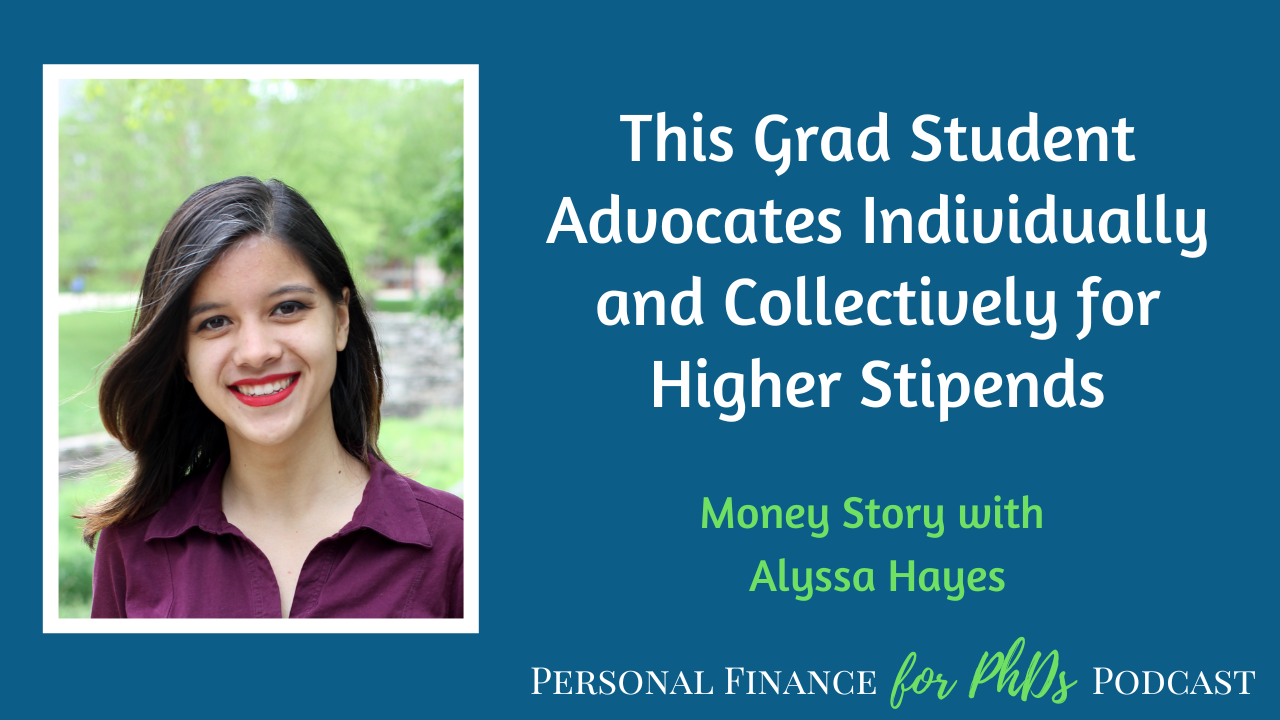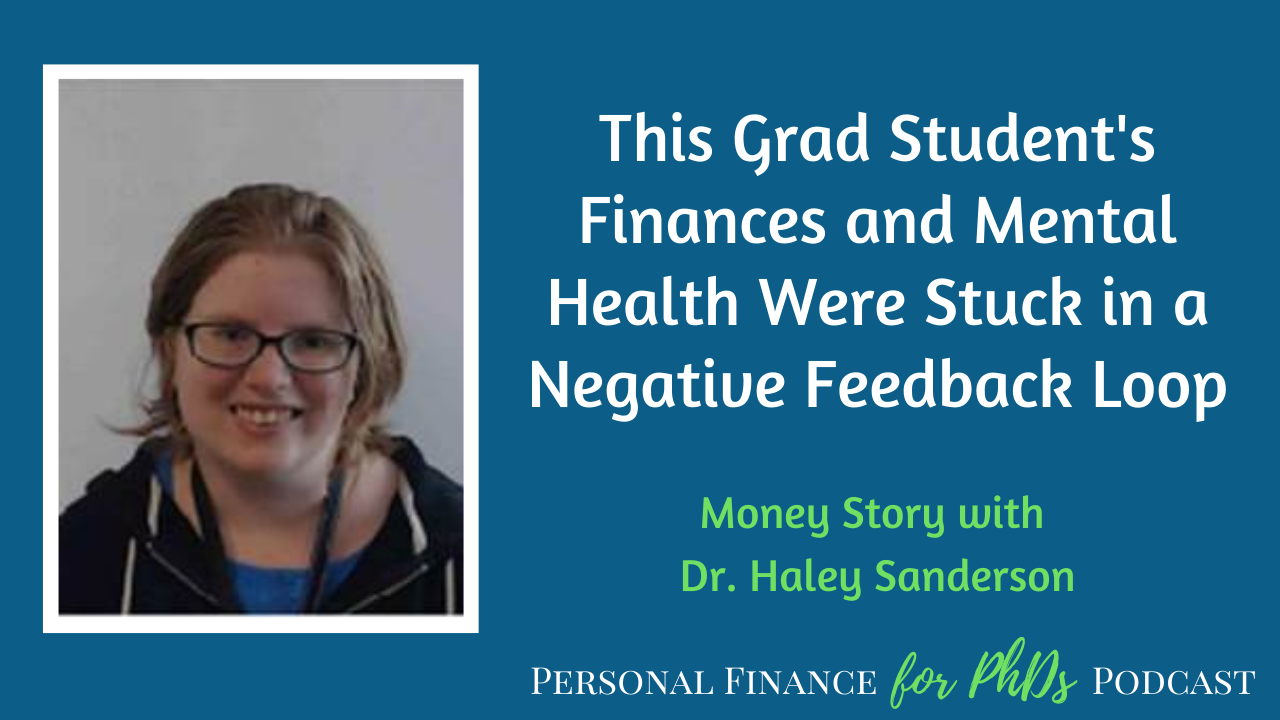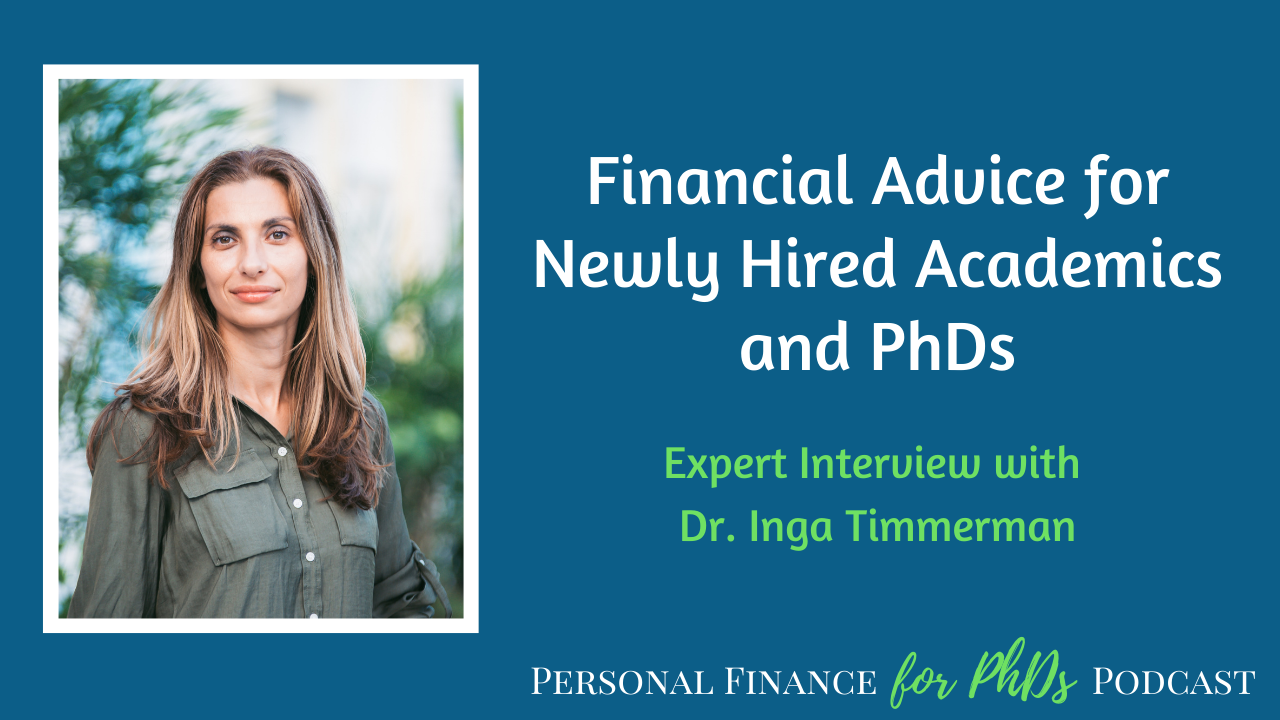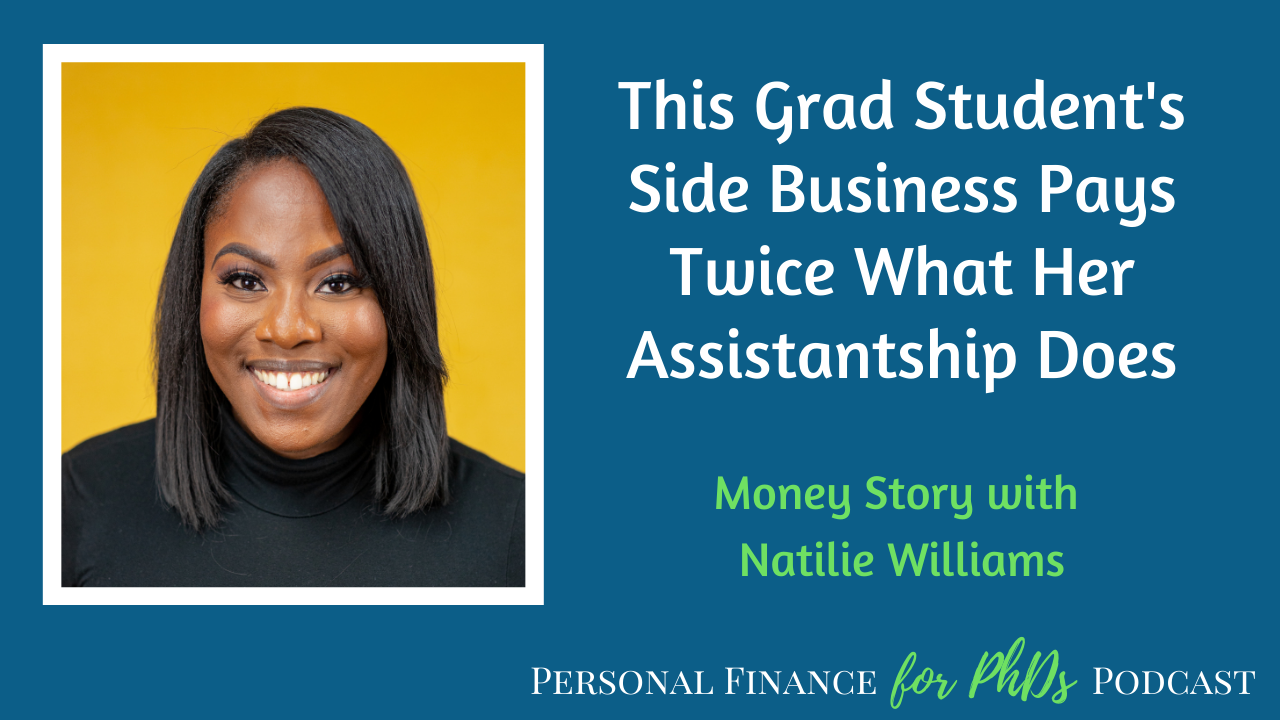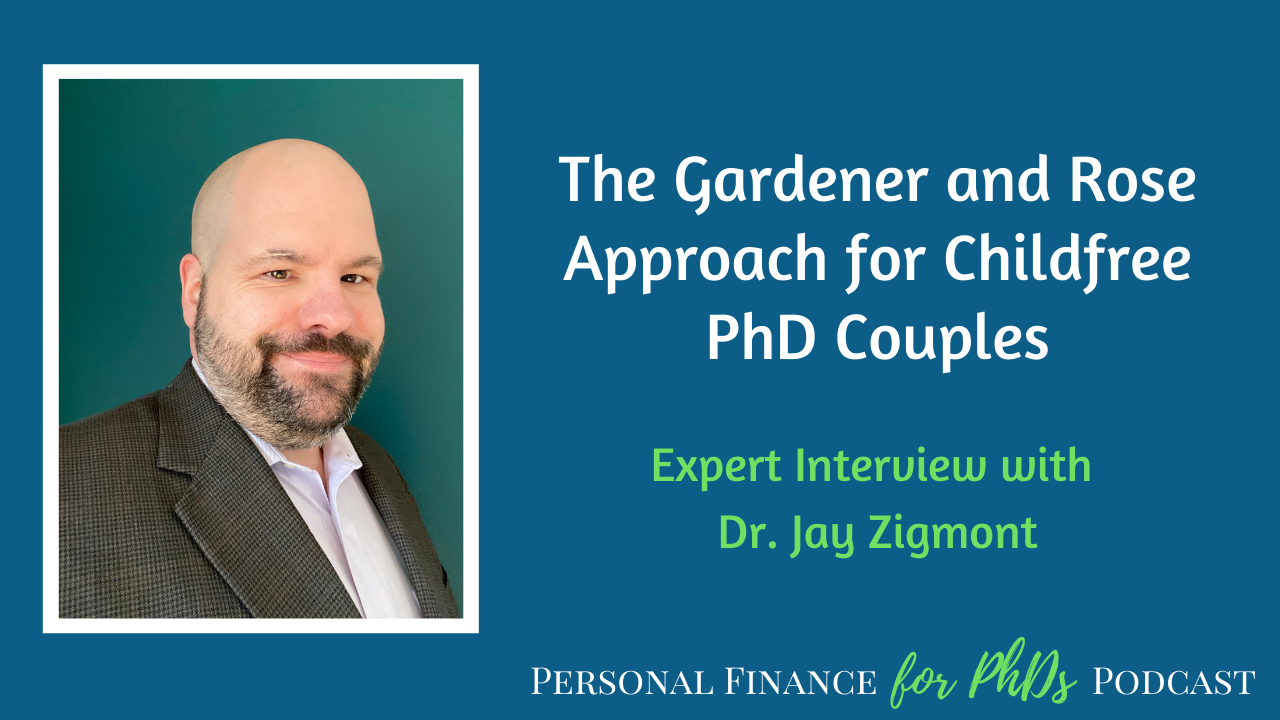In this episode, Emily details the steps that graduate students, postdocs, and postbacs who are switching onto non-employee fellowship funding should take to adequately prepare for next tax season. Fellows should set up a system of self-withholding starting with their first paycheck so they are prepared to pay their future tax bill(s). To avoid being fined for underpayment, fellows should assess whether they are required to pay estimated tax and do so if required. Emily has a workshop that walks fellows through these processes, which can be sponsored by your institutions.
Links Mentioned in this Episode
- PF for PhDs S12E6 Show Notes (Transcript)
- PF for PhDs S2 Bonus Episode 1: Do I Owe Income Tax on My Fellowship? (Expert Discourse with Dr. Emily Roberts)
- PF for PhDs Tax Resources
- PF for PhDs: The Complete Guide to Quarterly Estimated Tax for Fellowship Recipients
- PF for PhDs Video: Why Is My Fellowship Tax Bill So High?!
- PF for PhDs Video: What to Do When Facing a Huge Fellowship Bill
- PF for PhDs S6E9: How This Grad Student Fellow Invests for Retirement and Pays Quarterly Estimated Tax (Money Story with Lucia Capano)
- IRS Estimated Tax Payment Options
- PF for PhDs: Quarterly Estimated Tax for Fellowship Recipients (Workshop)
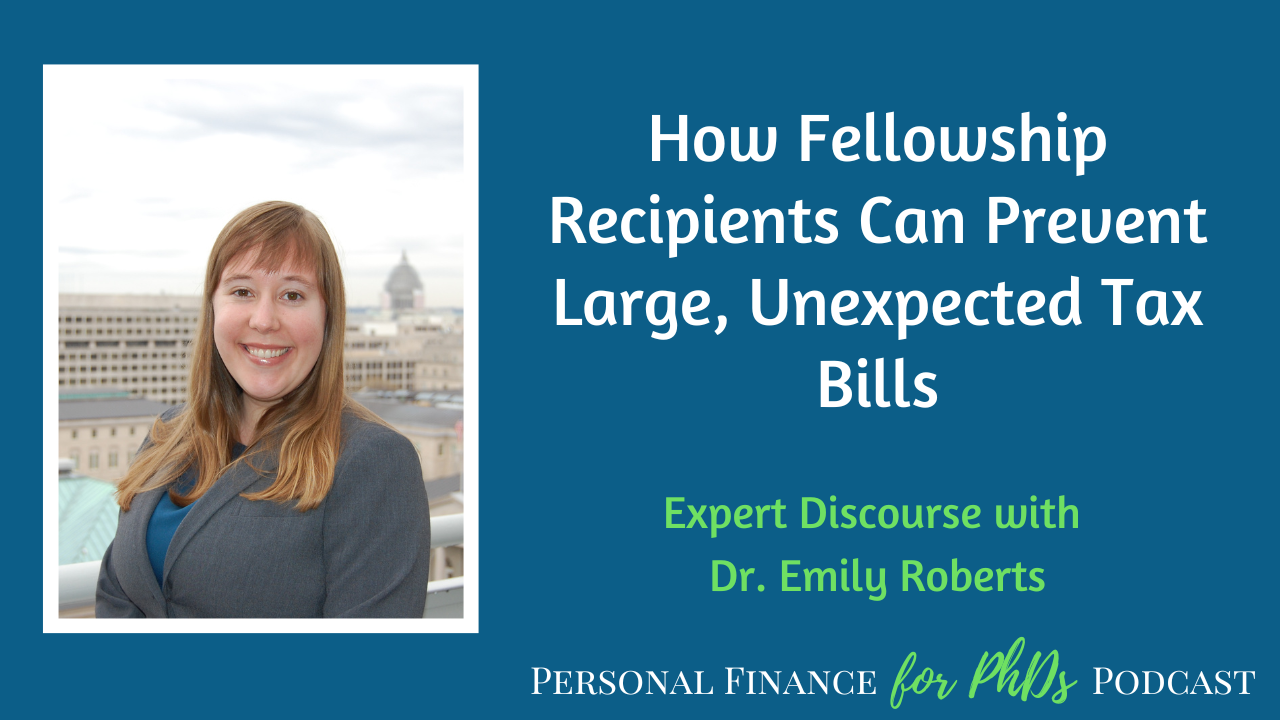
Introduction
Welcome to the Personal Finance for PhDs Podcast: A Higher Education in Personal Finance.
I’m your host, Dr. Emily Roberts, a financial educator specializing in early-career PhDs and founder of Personal Finance for PhDs.
This podcast is for PhDs and PhDs-to-be who want to explore the hidden curriculum of finances to learn the best practices for money management, career advancement, and advocacy for yourself and others.
This is Season 12, Episode 6, and today I don’t have a guest, but instead will detail the steps that graduate students, postdocs, and postbacs who are switching onto non-employee fellowship funding should take to adequately prepare for next tax season. Fellows should set up a system of self-withholding starting with their first paycheck so they are prepared to pay their future tax bills. To avoid being fined for underpayment, fellows should assess whether they are required to pay estimated tax and do so if required. I have a workshop that walks fellowship recipients through these processes, which can be sponsored by your institution.
You can find the show notes for this episode, including a full transcript, at PFforPhDs.com/s12e6/.
This episode is for you if all of the following are true:
- You are a US citizen, permanent resident, or resident for tax purposes.
- You are a graduate student, postdoc, or postbac at an institution in the US.
- You recently switched or will soon switch to being funded by a fellowship or training grant that will pay your stipend or salary in full or in part. More specifically, because the name of this type of funding does vary by institution and funding source, this is income that will not be reported at tax time on a Form W-2. You are not considered an employee of your institution, at least with respect to this funding source.
- Once you switch funding sources, you will not have income tax withheld from your paychecks. This is typically what happens for non-W-2 income, though there are rare exceptions.
If all those points describe you, please keep listening as what I’m about to explain is super important to your financial health! However, this podcast episode is for educational purposes only and should not be considered tax, legal, or financial advice for any individual. I am not a Certified Public Accountant or Certified Financial Planner. In this episode, I’m going to focus only on federal income tax, although in most cases what I’m saying applies at the state level as well.
I’ve just outlined the problem. You’re receiving income, but income tax is not being withheld from your paychecks. If you are not aware that this is happening or don’t know how to address it, you might be hit with a large, surprise tax bill and even a penalty once you prepare your tax return next spring. Every single tax season, I hear from graduate students and postdocs facing large, unexpected tax bills and they are desperate and panicking and it’s a really hard situation to be in. This podcast episode is one of my efforts to spread awareness of the tax complications that come with being a non-employee fellow so that no one else gets blindsided in this way.
Standard Employee Tax Liability
I want to back up for a moment to explain what most Americans experience with respect to their paychecks and define some terms so that we are on the same page about the unique situation that non-employee fellowship recipients are in.
If you are an employee, as you very likely have been at some point in your life, and you earn an income, you likely have a tax liability associated with that income. Your tax liability is the amount of money that you owe the IRS and possibly state and local tax agencies based on your income and some other factors like deductions and credits. Now, if you have a small income and/or lots of deductions and credits, you might have zero tax liability or even a negative tax liability. Pre-pandemic, 56% of Americans had a positive federal income tax liability.
Your employer helps you pay that income tax liability by withholding income tax on your behalf. So when you receive a paycheck, you don’t receive your full gross income, you receive your income less the applicable income taxes, payroll taxes, etc. Your employer sends this money to the IRS and it’s counted against your total tax liability for the year.
Each tax season, we prepare our income tax returns. That’s when you or your tax preparer or your tax software of choice fill out IRS Form 1040 and other forms to precisely calculate your tax liability for the year that just ended. The tax liability that you calculate on your tax return is compared to the amount of income tax that was withheld and sent to the IRS on your behalf. If the amount withheld exceeded your tax liability, the excess amount is refunded to you. If your tax liability exceeded the amount withheld, you will pay the balance when you file your tax return.
That’s the normal employer withholding situation that most Americans experience. But what if you are paid by a fellowship or training grant and your university or institute, who is not your employer, doesn’t withhold any income tax on your behalf?
Non-Employee Fellowship Recipient Tax Liability
Some fellows, upon seeing that no income tax is being withheld from their paychecks, think that their income is exempt from income tax. This is not the case. Fellowship income of the type I describe is taxed as ordinary income. Prior to tax reform in the 1980s, it was not subject to income tax, and I’m sure that’s part of where the confusion comes from. If you want a deeper exploration of the taxability of fellowship income, please listen to Season 2 Bonus Episode 1, “Do I Owe Income Tax on My Fellowship?”
So, your income is subject to income tax, but no income tax is being withheld from your paychecks. The natural outcome of this situation is that when you fill out your tax return next spring, you are likely to find that you owe some money to the IRS. How large or small the amount of money is depends a lot on your personal circumstances, but somewhere in the $1,000 to $4,000 range is pretty typical.
However, the IRS actually isn’t too keen on people owing large bills at tax time. They’d rather receive their pound of flesh gradually throughout the year. And, frankly, a lot of people simply wouldn’t be able to pay their tax owed if presented with a large, one-time bill. That’s why employers withhold income tax on behalf of their employees and send it off to the IRS incrementally throughout the year.
To resolve this issue for people who don’t have employers, like fellows, the IRS deployed the estimated tax system. The estimated tax system is a mechanism by which the IRS accepts income tax payments four times per year from anyone who might otherwise have one of these large outstanding bills at tax time.
PF for PhDs Tax Resources
With that background, what should a new fellow do to stay on top of their unique tax situation? There are two important steps to take.
We will dive deep into those answers momentarily, but first I want to point you to additional resources on this topic.
You can find all my free articles and podcast episodes on this topic linked from PFforPhDs.com/tax/. Most notably, check out my article “The Complete Guide to Quarterly Estimated Tax for Fellowship Recipients.” It covers a lot of the same ground as this episode.
If you want some additional assistance, I recommend joining my paid workshop, Quarterly Estimated Tax for Fellowship Recipients. It takes you step-by-step and in great detail through the processes I’m about to describe, plus you have the opportunity to ask me questions during live Q&A calls.
If you would like to take this workshop, you can purchase it as an individual from PFforPhDs.com/qetax/. However, I also make it available to university clients at a discounted bulk rate. Please ask your graduate school, graduate student association, or postdoc office if they will sponsor this workshop for you and any interested peers, and point them to the link PFforPhDs.com/sponsorQEtax/.
Finally, if you are discovering this episode during the 2022 tax season or a subsequent tax season and you’re already facing a large, unexpected tax bill due to your fellowship, I recommend viewing two of my videos, “Why Is My Fellowship Tax Bill So High?!” and “What to Do When Facing a Huge Fellowship Tax Bill.”
You can find all of those pages linked from the show notes, PFforPhDs.com/s12e6/.
Step #1: Estimate Your Tax Liability
Now back to the two vital steps you should take at the point that you switch over to receiving paychecks with no income tax withholding.
Step #1 is to estimate your tax liability for this year and set up your system of self-withholding. “Self-withholding” is what I call this process, not necessarily what anyone else calls it. Basically, you are going to set aside the fraction of each of your paychecks that you expect to ultimately pay in income tax and save up those sums for when you have to pay your tax bills.
The first part of this step is to estimate your tax liability for this year so you know how much you’ll owe to the IRS and your state and local tax agencies, if applicable. Again, I’m just focusing on federal income tax in this episode. I know of two good ways to make such an estimate.
Method A: Form 1040-ES
Method A is the most accurate, and that is to fill out the Estimated Tax Worksheet on page 8 of IRS Form 1040-ES. I’m going to talk more about the Estimated Tax Worksheet in Step #2, but for now all you need to know is that it helps you estimate your tax liability for the current tax year. If you’re listening to this in real time, the 2022 Estimated Tax Worksheet is basically a high-level draft of your 2022 tax return. It will take into account the income and income tax withholding you had in the former part of 2022 and well as the income you expect to receive in the latter part. You will also factor in your expected tax deductions and credits for 2022, if any. The worksheet processes all of this information and in Line 14b presents the amount of your 2022 tax bill above whatever might have been withheld earlier in the year. If you’re married filing jointly, the worksheet incorporates both your information and your spouse’s. In a typical fellowship case, though certainly not every case, the fellow has some additional tax liability there in Line 14b, as I mentioned earlier, usually in the low 4-figures. Keep in mind for Method A that it is the most accurate estimate of the size of your tax bill, but it’s specific to the tax year you filled it out for. Once we roll into 2023 and subsequent years, if you’re still not having income tax withheld from your paychecks, you’ll need to fill out that year’s version of the Estimated Tax Worksheet for what specifically is going on for you in that tax year as soon as it’s available.
Method B: Income Tax Calculator
Method B is the fastest, and that is to use an income tax calculator. This is a good approach if you expect to have a super simple tax return, for example taking the standard deduction and no tax credits. I’d also say this method is better for single people, not married couples. The calculator I like best is from smartasset.com. Just search ‘smartasset income tax’ and it should be the first result. Because I’m keeping this approach really fast and simple, I actually suggest that you plug your 12-month fellowship income into the Household Income field. For example, if you’re starting to receive the NSF GRFP award in fall 2022, that’s $34,000 paid out throughout the 2022-2023 academic year. So even though you’re only getting part of that in 2022 and maybe you had some other income level earlier in the year, just put $34,000 in that household income field to get an idea of how much tax you can expect to owe over the first 12 months of receiving that award. Then, fill in the remaining details the calculator asks for and scroll down to the populated table. Looking at the federal income tax line will show you an estimate of your federal income tax liability due from your next 12 months of income. Method B is not going to be very accurate for your actual 2022 tax liability—Method A is better for that—but it is an easy way to get a decent number to use in the second part of Step #1.
Start Saving for Future Tax Bills
The second part of this step is to start saving for those future tax bills. If you used Method A, take that estimated tax bill and divide it by the number of fellowship paychecks you expect to receive in 2022. For example, if you’re paid monthly starting in August, that’s 5 paychecks, so divide your estimated tax bill by 5. If you used Method B, divide that 12 month expected tax liability by the number of paychecks you expect to receive over those 12 months. This is the dollar amount that you should set aside from each paycheck to go toward your future tax bill.
To actually, mechanically, set up your system of self-withholding, I recommend opening up a savings account that is solely dedicated to housing money that you expect to pay in tax in the future. Yes, you could keep this money in your checking account or a multipurpose savings account, but in my opinion it is way too easy to dip into this savings balance for another expense, whether intentionally or accidentally. When you open this account, make sure that you aren’t paying any fees and there are no minimum balance requirements, because you are expecting to pretty much drain this account at some point or points in the future. Online-only banks like Ally offer these kinds of savings accounts in case your current primary bank does not.
Once you have the savings account open, set up an automatic contribution. For example, if you are paid on the first of every month into your checking account, set up a recurring transfer in the proper amount for the 5th of the month from your checking account into this dedicated savings account. And when you set up the amount, round up on that calculated transfer amount in case your estimated tax liability was a bit low. Better to have a little money left in this account that you can transfer out and use for another purpose after you pay your tax bill than to come up short. If you do have savings left over, this is what I call a self-tax refund. It’s like receiving a refund from the IRS after filing your tax return, but better because that money was in your account gaining interest that whole time instead of in the IRS’s coffers.
If you would like to hear more about this system of self-withholding, listen to my Season 6 Episode 9 podcast interview with Lucia Capano titled “How This Grad Student Fellow Invests for Retirement and Pays Quarterly Estimated Tax.”
Step #2: Determine Tax Bill Due Dates
Now that you are all set up to pay your future tax bill or bills, we can move on to Step #2, which is to figure out when those tax bills are actually due.
Step #2 is to figure out if you owe estimated tax and to pay it quarterly if so. If you are expected to pay estimated tax and fail to, you may be assessed a fine after you file your tax return.
Earlier, I mentioned that the IRS expects to receive tax payments throughout the year via the estimated tax system if you aren’t having income tax automatically withheld. While that is a blanket true statement, there are exceptions. Certain graduate students, postdocs, and postbacs may not be required to make estimated tax payments.
One of the exceptions is if you owe less than $1,000 in a tax bill at tax time. So for example, if you started receiving fellowship income really late in the calendar year and it didn’t add up to all that much or if your tax withholding in the earlier part of the year was rather excessive, your additional tax liability above the level of your withholding might not rise to $1,000. In that case you wouldn’t be required to make any estimated tax payments. Keep in mind that you still have that tax liability though, and you’ll pay all your tax due when you file your income tax return during tax season.
Estimated Tax Worksheet
To figure out for sure whether you’re required to pay estimated tax, you have to fill out the Estimated Tax Worksheet on page 8 of Form 1040-ES. I said for Step #1 Method A that the Estimated Tax Worksheet will give your most accurate estimate of your tax liability for the current year, and its other function is to answer this question about the requirement to pay estimated tax. There are multiple ways you can be exempted from this requirement, not just the one I outlined a moment ago, so it really behooves you to fill out this worksheet in its entirety.
If you get all the way to Line 15 of the worksheet, it tells you your expected quarterly payment amount. Now, this part is a little tricky for people who switch onto fellowship mid-calendar year because you aren’t going to make four quarterly payments in the current calendar year, only the 1-2 remaining payments, so you need to recalculate your payment amount using the number in Line 11c.
If I’ve lost you a little bit with this discussion of the Estimated Tax Worksheet in Form 1040-ES, don’t worry. It’s hard to understand just from listening to a podcast episode. I expect it will make much more sense once you’re looking at the worksheet. But if it doesn’t, you can join my workshop, Quarterly Estimated Tax for Fellowship Recipients, which walks you line by line through the worksheet and answers the most common questions I receive from PhD fellows about things like switching funding sources mid-calendar year and being married to someone with automatic income tax withholding.
The important takeaway from this Step #2 is that you should use the Estimated Tax Worksheet to determine whether you are required to pay estimated tax.
If you are required to pay estimated tax, make the payments using the money that’s built up in your dedicated savings account. You can view your payment options at IRS.gov/payments. The payment deadlines are typically April 15, June 15, September 15, and January 15 unless a holiday pushes one back. Yes, you heard me correctly! Confusingly, the so-called quarters are not all 3 months in length.
If you are not required to pay estimated tax, you don’t need to take any further action until tax season. You can draw upon your earmarked savings to pay your tax balance due when you file your tax return.
One last note about the Estimated Tax Worksheet. It is specific to each tax year, so if you’re still on fellowship at the start of next calendar year, please fill that year’s version out when it becomes available, which is usually around March. Your 2022 Estimated Tax Worksheet might have concluded that you weren’t required to pay estimated tax in 2022, but you can’t assume that’s going to be the case for 2023 as well. Even if you are required to pay in both years, your quarterly payment amount might change. I suggest filling out a new Estimated Tax Worksheet at the start of every calendar year and every time your income changes until you once again have automatic tax withholding on your paychecks.
Conclusion
We have come to the conclusion of this episode. Here are your action steps if you switched or will switch onto fellowship income without automatic income tax withholding near the start of this academic year: 1) Estimate your future tax bill and start saving for it. 2) Determine whether you are required to pay estimated tax and follow through if so.
If you found this episode valuable, please share it with your peers over social media or an email list-serv. Know that probably every time you do so, you are playing a role in preventing a severe financial hardship from occurring in someone’s life.
If you would like to take my workshop, Quarterly Estimated Tax for Fellowship Recipients, please attempt to find a sponsoring office or group at your university before purchasing it yourself. Even if you don’t need the workshop now but you wish you had taken it in a prior year, please recommend it. The potential sponsor can find more information at PFforPhDs.com/sponsorQEtax/. The workshop includes 1.75 hours of pre-recorded video content, a spreadsheet, and invitations to live Q&A calls with me leading up to each quarterly deadline for the current tax year. I’m here to help anyone who needs assistance with these matters. Thank you in advance for making that recommendation and helping to prevent large, unexpected tax bills and penalties among your peers.
